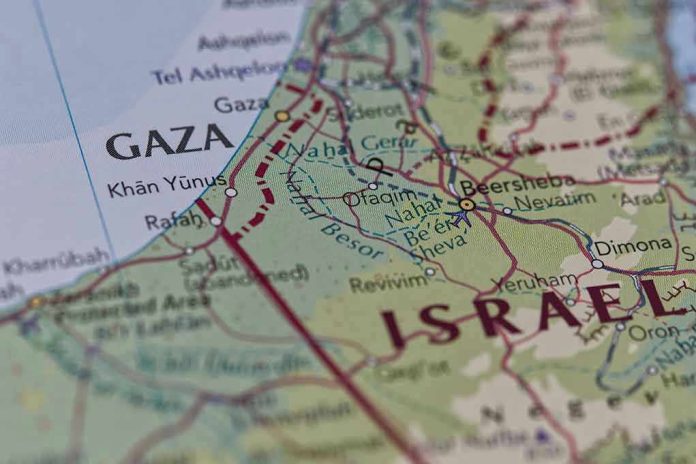
In a stunning turn of events, Israel resumes airstrikes in Gaza following Hamas’s refusal to release all hostages, ending a short-lived ceasefire.
Story Highlights
- Hamas agrees to a ceasefire and hostage exchange, brokered by Egypt and Qatar.
- The agreement included releasing 10 Israeli hostages and 1,700 Palestinian prisoners.
- Israel accuses Hamas of non-compliance, leading to resumed airstrikes.
- The ceasefire, supported by the UN and US, collapses after two months.
Ceasefire Agreement and Its Breakdown
The recent ceasefire agreement between Hamas and Israel, brokered by Egypt and Qatar, has sparked both hope and skepticism. The deal involved an exchange of hostages and prisoners, with Hamas releasing 10 Israeli hostages and the return of 18 bodies in exchange for 1,700 Palestinian prisoners. Despite international mediation, the ceasefire was short-lived, collapsing after Israel accused Hamas of failing to release all hostages.
Israel resumed airstrikes on March 18, 2025, marking the end of the ceasefire. Prime Minister Benjamin Netanyahu cited Hamas’s non-compliance as justification for the renewed military action. The ceasefire, which lasted from January 19 to March 18, 2025, was initially supported by a UN Security Council resolution and diplomatic backing from the US.
Background and Historical Context
The Gaza conflict, rooted in decades of Israeli-Palestinian hostility, has seen numerous attempts at ceasefires, often brokered by international parties. Hamas, an Islamist militant group, has controlled Gaza since 2007 and has been involved in multiple conflicts with Israel. The humanitarian situation in Gaza remains dire, with international mediators like Egypt and Qatar playing key roles in attempting to broker peace.
The 2023–2024 Gaza war resulted in significant casualties and a humanitarian crisis, prompting renewed international efforts to mediate a ceasefire. The recent agreement was reminiscent of the 2011 Gilad Shalit deal, where over 1,000 Palestinian prisoners were exchanged for one Israeli soldier.
Implications and Future Prospects
The collapse of the ceasefire underscores the challenges of achieving lasting peace in the region. The temporary pause in violence allowed for essential humanitarian relief, but the resumption of hostilities threatens ongoing efforts. The large-scale exchange of prisoners could have long-term security implications, potentially emboldening militant groups.
Critics argue that both sides have used hostages and prisoners as bargaining chips, complicating future negotiations. The involvement of international mediators highlights the global dimension of the conflict, with Egypt and Qatar reinforcing their diplomatic roles. As hostilities resume, the path to lasting peace remains fraught with challenges.
Sources:
2025 Gaza War Ceasefire – Wikipedia




